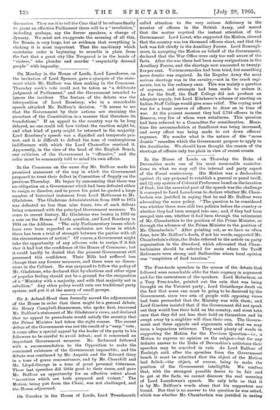On Tuesday in the House of Lords, Lord Tweedmouth
called attention to the very serious deficiency in the number of officers in the British Army, and moved that the matter required the instant attention of the Government. Lord Lovat, who supported the Motion, showed that the country was ten thousand officers short, and that the lack was felt chiefly in the Auxiliary forces. Lord Donough- more, in accepting the Motion on behalf of the Government, declared that the War Office were only too well aware of the facts. After the war there had been many resignations in the Auxiliary Forces, and the shortage now amounted to twenty: five per cent. Various remedies had been tried, but something more drastic was required. In the Regular Army the most serious shortage was in the cavalry,—not in the crack regi- ments, but in the ordinary ones. This was mainly a question of expense, and attempts bad been made to reduce it. As for the Staff, the Staff. College did not produce an adequate supply, but Lord Kitchener's scheme of starting an Indian Staff College would give some relief. The crying need was for a large reserve of officers to draw on in time of war. At the present moment they had 2,744 officers in the Reserve, very few of whom were subalterns. This question bad been referred to a Committee for consideration. Mean- time the accommodation at Sandhurst was being increased, and every effort was being made to cut down officers' expenses. We wonder what is the nature of the "more drastic" remedies which the Government propose to apply to the Auxiliaries. We should have thought the reason of the shortage of officers only too plain in view of recent events






































 Previous page
Previous page